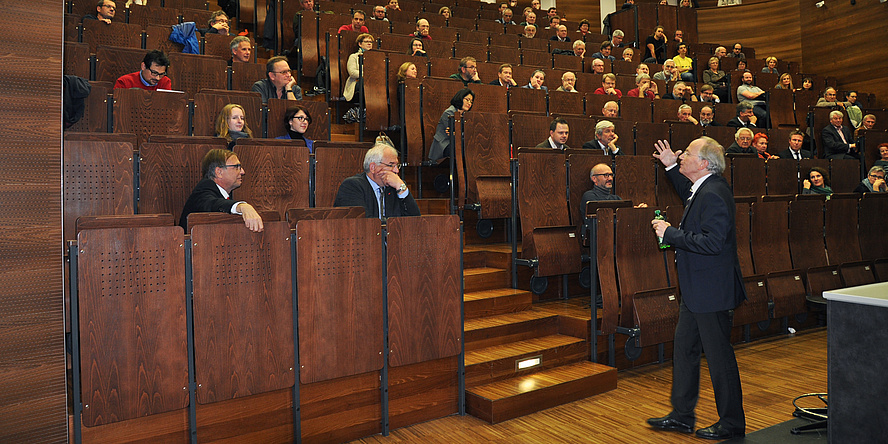With over 5.100 students in the 19 bachelor’s and master’s programmes and some 630 doctoral students, the successful inter-university cooperation project
NAWI Graz Teaching has now been running for ten years and benefitting both students and teaching staff. On October 19 the anniversary was celebrated in the
Hörsaal H "Ulrich Santner" at
TU Graz. An interview with
Detlef Heck, deputy chairman of the
NAWI Graz Steering Committee.
News+Stories: What was the basic idea behind NAWI Graz Teaching when it was first offered in 2006?
Detlef Heck: Strengthening strengths – this short slogan summarises the basic idea of NAWI Graz Teaching. Apart from this, the idea of NAWI Graz Teaching is captivating from the point of view of the students. After all, it offers a greater breadth of studies so that students can follow even more of their fields of interest. Both universities, the University of Graz and TU Graz, thus offer specialist teaching in the natural sciences from which they both benefit. Of course, behind NAWI Graz Teaching there is a considerable coordination process which doesn’t cut back on the range of courses, but rather trims it down to a critical mass to offer value added in teaching and research.
Were there any obstacles or stumbling blocks at the beginning?
Detlef Heck: It goes without saying that it is no small thing to adapt long-established structures in tradition-conscious universities to new objectives. After visionaries in both universities recognised what opportunities could result from a partnership to a serious cooperation, stumbling blocks were removed. On top of this, it shouldn’t be disregarded that many details still had to be solved in administration, from the student management system to legal questions.
Strengthening strengths – this short slogan summarises the basic idea of NAWI Graz Teaching.
How do students and teaching staff benefit from this inter-university cooperation project?
Detlef Heck: In my view, our students benefit from a bigger range of programmes, especially from the diversity of the master’s programmes, and from the cooperation of both universities. The diversity of students from both unis leads in any case to a better togetherness and to an understanding of their different perspectives.
In what direction are the NAWI Graz study programmes developing?
Detlef Heck: The available study programmes are being constantly evaluated and improved. This is accompanied by joint appointments of professors and enables an even greater diversity to be brought about. With the expansion of the English-language master’s programmes and more courses held in English, we are preparing our students for the increased demands of the job market. Additionally, a greater depth in the master’s programmes will provide the basis for a science career. Two further English-language
NAWI Graz master’s programmes – Physics and Technical Physics – are planned to be launched in the 2017/18 academic year.
The available study programmes are being constantly evaluated and improved.
The first joint professorial appointment took place in 2010 – how successful are the joint professorships and in what direction will they develop?
Detlef Heck: When a professorship becomes free in the area of NAWI Graz, the specialist colleagues decide among themselves what professorship would make sense from a strategic point of view. This is then staffed by the respective university. Members of both universities are on the Appointment Committee so that here, too, shared coordination and a cooperative path are taken. The choice of professorships to be newly filled is thus a step towards well coordinated areas which best allow synergies in teaching and research.

